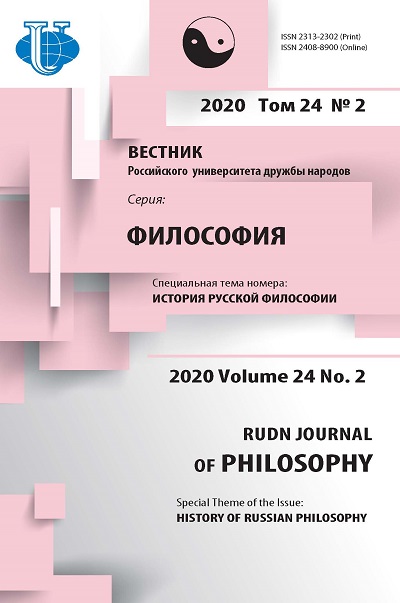Idea of the Proof
- Authors: Anisov A.M.1
-
Affiliations:
- Institute of Philosophy RAS
- Issue: Vol 24, No 2 (2020): HISTORY OF RUSSIAN PHILOSOPHY
- Pages: 228-243
- Section: ONTOLOGY AND EPISTEMOLOGY
- URL: https://journals.rudn.ru/philosophy/article/view/23678
- DOI: https://doi.org/10.22363/2313-2302-2020-24-2-228-243
- ID: 23678
Cite item
Full Text
Abstract
The article explores the informal side of the idea of the proof. The word "idea" is used in a sense dating back to Plato. Proof is understood as a precisely established connection of precisely formulated and objectively existing ideas. This connection of ideas belongs to the realm of the possible and can be present in some possible worlds and absent in others. Attempts to interpret the proof as a procedure of convincing argumentation are criticized. It is shown that the proof is not necessarily convincing, and that persuasiveness may be inherent outside the proof-based forms of argument. The genesis of the idea of the proof is briefly traced from its origins to the present day. Arguments are made in favor of the thesis of the idea of the proof in Pythagorean philosophy. The question of why the idea of the proof has not been rediscovered anywhere and never is discussed. The problem of the time gap between the appearance of the proof and the exact definition of the concept of the proof in modern logic is considered. An accessible example substantiates the inseparability of the idea of the proof from its formal presentation in one or another logic. A list of some basic informal predicates of the proof is given and a brief description is given.
Keywords
About the authors
A. M. Anisov
Institute of Philosophy RAS
Author for correspondence.
Email: anisov@land.ru
Doctor of Philosophy, professor, leading researcher at the Institute of philosophy
Russian Federation, 109240, Moscow, Goncharnay, 12/1References
- Anisov AM. Chto takoe nauka? RUDN Journal of Philosophy. 2011; (3): 120—130.
- Anisov AM. Ponimanie matematicheskih dokazatel'stv i EVM. Voprosy filosofii. 1987; (3): 29—40.
- Anisov AM. Sovremennaya logika. Moscow: IF RAN; 2002.
- Frege G. Logika i logicheskaya semantika: Sbornik trudov. Moscow: Aspekt Press, 2000.
- Pavlenko AN. Predely intersub'ektivnosti (kritika kommunikativnoi sposobnosti obosnovaniya znaniya). SPb.: Aleteiya, 2012.
- Kuzina EB. O ponyatii dokazatel'stva. Logicheskie issledovaniya 2018. T. 24. № 2. S. 100—107.
- Krants S. Izmenchivaya priroda matematicheskogo dokazatel'stva. Dokazat' nel'zya poverit'. Moscow: Laboratoriya znanii, 2016.
- Dragalin AG. Konstruktivnaya teoriya dokazatel'stv i nestandartnyi analiz. Moscow: Editorial URSS, 2003.
- Plisko VE, Hahanyan VH. Intuitsionistskaya logika. Moscow: Izd. meh-mat. f-ta MGU, 2009.
- Van der Varden. Probujdayuschayasya nauka. Matematika Drevnego Egipta, Vavilona i Gretsii. Moscow; 1959.
- Krushinskii AA. Logika drevnego Kitaya. Diss. na soisk. uch. st. doktora filos. nauk (Spetsial'nost' 09.00.07 — logika). Moscow; 2006.
- Krushinskii AA. Logika Drevnego Kitaya. Moscow: IDV RAN; 2013.
- Smirnov VA. Formal'nyi vyvod i logicheskie ischisleniya. Moscow: Nauka; 1972.
- Smirnov VA. Teoriya logicheskogo vyvoda. Moscow: ROSSPEN; 1999.
- Takeuti G. Teoriya dokazatel'stv. Moscow: Mir, 1978.
- Pravits D. Natural'nyi vyvod. Teoretiko-dokazatel'stvennoe issledovanie. Moscow: LORI; 1997.
- Anisov AM. Ontologicheskii status dokazatel'stv svedeniem k absurdu. Loj' kak problema formal'noi ontologii. AN Pavlenko, AM Anisov, VL Vasyukov, SA Pavlov. St. Petersburg: Aleteiya; 2019. P. 123—187.
- Medvedev FA. Rannyaya istoriya aksiomy vybora. Moscow: Nauka, 1982.
- Moore GH. Zermelo's Axiom of Choice: Its Origins, Development, and Influence. New York: Springer-Verlag; 1982. XIV. 412 p.
- Jech T. Set Theory. New York: Springer; 2003. XIII. 769 p.
- Spravochnaya kniga po matematicheskoi logike: in 4 parts. Dj. Barvais (ed.). Part IV. Teoriya dokazatel'stv i konstruktivnaya matematika. Trans. from Eng. Moscow: Nauka; 1983.
- Troelstra AS, Schwichtenberg H. Basic Proof Theory. Cambridge: Cambridge University Press, 1996. XI. 343 p.
- Barker-Plummer D, Barwise J, Etchemendy J. Language, proof, and logic. 2nd ed. CSLI Publications, 2011. XIII. 606 p.
Supplementary files















